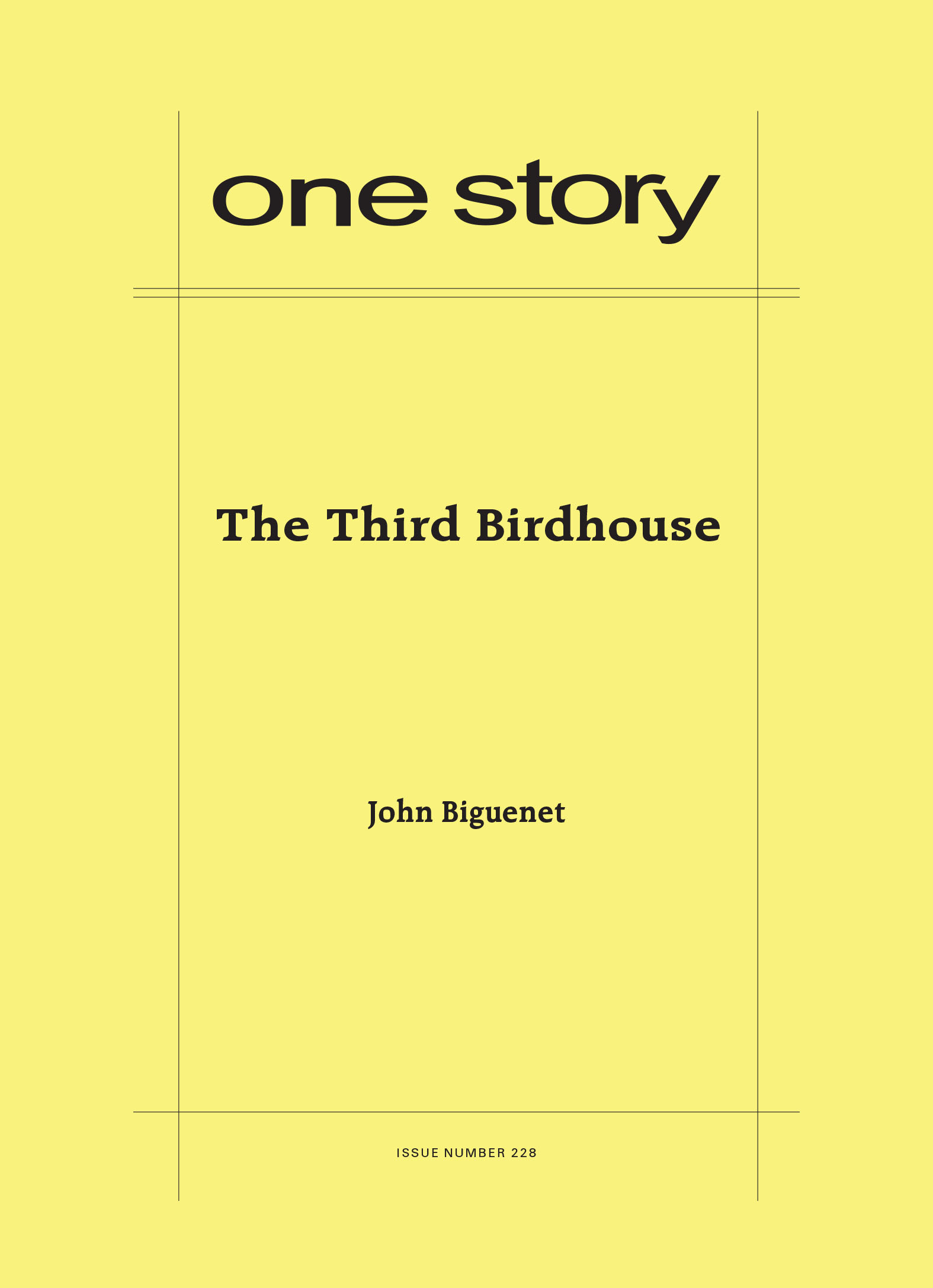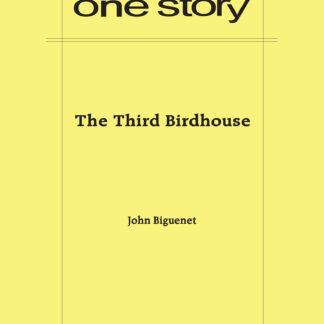
The Third Birdhouse
$2.50
87 in stock
Excerpt
Father dragged me by the arm from my narrow bed. Groggy with sleep, I did not resist.
He shuffled along the dark hallway in the worn slippers and tatty robe he wore day and night, hushing me when I started to complain as I stumbled after him, barefoot in my pajamas. We paused at the top of the cellar stairs while he pulled on the light with the beaded chain I could not yet reach. Then he shut the door to the kitchen behind us, and I followed him down the wooden staircase, my wrist chafing in his trembling grip.
He waited for me to take my two small sidewise steps on each stair as we descended into his workshop.
It was not the first time I had been rousted from childish dreams by Father. I was a late baby: my mother, nearly fifty when she found herself swelling with pregnancy, had laughed at the doctor’s diagnosis of her symptoms, and she gave birth three days after her husband’s sixtieth birthday. They called me a miracle child, an answered prayer, and constantly hovered over their precious son. But arriving after thirty years of marriage, I had to accommodate myself to their ingrained habits. For example, my father had lived a life devout to the point of fanaticism, so I had been dragged down the stairs before in the middle of the night to kneel beside the old man. Even now, all these years later, I still remember the thump of his fist against his chest as he mumbled prayers in a language I did not know, a language I never learned.
John Biguenet
John Biguenet has published nine books, including The Torturer’s Apprentice: Stories, Oyster: A Novel, The Rising Water Trilogy: Plays, and most recently Silence. His work has appeared in such magazines as Story, The Atlantic, Esquire, Granta, Guernica, Image, The New Republic, Playboy, The Southern Review, Storie (Rome), The Sun, Tin House, TriQuarterly, and Zoetrope. The winner of an O. Henry Award for short fiction, he’s had six plays widely produced, most recently Broomstick, written entirely in rhyme. His stories have been reprinted or cited in The Best American Short Stories, The Best American Mystery Stories, The Best of the Best, Prize Stories: The O. Henry Awards, and various other anthologies in the U.S. and abroad. Past president of the American Literary Translators Association and a former New York Times guest columnist, he’s served as writer-in-residence at various universities and currently teaches at Loyola University in New Orleans. More info at www.biguenet.com.
Will Allison on “The Third Birdhouse”
In one of the Old Testament’s more unsettling tales, God commands Abraham to sacrifice his only son, Isaac. The devout Abraham takes Isaac to a mountaintop, builds an altar, and binds his son to it. Just as Abraham raises his knife, though, an angel intervenes. “Now I know you fear God,” the angel says, “because you have not withheld from me your only son.” Abraham ends up killing a ram instead, and as a reward for his obedience, God blesses Abraham’s family.
Things don’t work out quite so well for Abraham in “The Third Birdhouse,” John Biguenet’s contemporary retelling of Isaac’s life: it’s not okay in twentieth-century Brooklyn to try to murder your son with a hatchet, even if you think God told you to. But things do work out for the narrator, who—like the biblical Isaac—goes on to lead a long and prosperous life, with twin sons of his own.
The question is what kind of dad this modern Isaac will be, given the poor role model of Abraham. Isaac’s big test comes when his younger son, Jacob, swindles his twin brother out of his inheritance, just like in the Bible. How will Isaac respond? Raise the hatchet? Bury the hatchet? Hatch a compromise? His solution surprised me, and it’s one I’m still grappling with, which is partly why I love this story: like all good literature, it challenges the reader, posing questions rather than answering them.
John Biguenet, on the other hand, was more than happy to answer our questions. Be sure to check out his author interview to learn how birdhouses found their way into this retelling of Isaac’s story and to get John’s distinctive take on the reading habits of Donald Trump.
Q&A by Will Allison
- WA: Where did the idea for this story come from?
- JB: Like so much in the Old Testament, the story of Abraham and Isaac is very troubling. Perhaps most confounding, though, is the conclusion, when Isaac’s firstborn son, Esau, having been cheated of his birthright by Jacob, eventually forgives his brother. “The Third Birdhouse” is a kind of meditation on that ancient story, exploring the limits of forgiveness.
- WA: You’ve worked in many forms, from essays and plays to short stories and a novel. Why did you choose the short story form for this particular material?
- JB: The short story, for me, is a form best suited to depicting a moment of moral crisis. Of course, that moment may last a lifetime, and “moral” is more about a just proportion than a religious stricture. If “The Third Birdhouse” had been expanded into a novel or a play, its central conflict would have dissipated among other contending elements. As for poetry, parts of the story might work as poems, but not as narrative poems. Both the length and the form were also dictated by a practical concern: how would an old man with failing eyesight tell the story of his life if he wrote it in a single night?
- WA: What was the most challenging aspect of writing this story?
- JB: The transition from the narrator’s childhood to old age required the most concentration since it demanded the depiction, in just a few pages, of a lost world with which most readers will be unfamiliar.
- WA: During our correspondence, we discussed the ending of the story. Could you talk about the conclusion?
- JB: The original title of the story was “Isaac, Later.” At first, I focused on what happens to a person who survives a near-fatal attack in childhood. As I continued to work on the story, I began to see that when such trauma occurs between father and son, the lasting effects will reveal themselves when the son becomes a father himself. Having seen a father’s violence, will the son imitate or repudiate his father when he has boys of his own? My job as a writer is to pose such questions, but I think to answer them for the reader would be presumptuous. Why does the narrator allow a scheming son to swindle his brother, and why does that same narrator counsel the victim to forgive this theft? I leave it to the reader— just as the narrator has left it to his firstborn son—to wrestle with those questions.
- WA: Why did you choose to set this particular retelling of the story of Abraham and Isaac in mid-What was the most challenging aspect of writing this story0th-century Brooklyn instead of, say, in your hometown of New Orleans?
- JB: An essential element of the story is the role of language, whether as the sacred speech of prayer, the spiel of a salesman, the brevity of courtship in wartime, or the written testament of an old man. (Most telling, perhaps, is the narrator’s references to having been salutatorian at his high school, where his welcome of graduating classmates is actually a farewell: “But except for knowing how to say goodbye to people, I didn’t know what else to say.”) So I needed a setting where a diversity of spoken languages provided opportunities to integrate this theme naturally. I also needed a setting where a thriving Jewish community would justify the Judaic elements of the story. My mother was from Brooklyn, and I spent my summers there as a child. It’s a setting with which I had firsthand experience and which met the needs of the story.
- WA: And why birdhouses?
- JB: Without a mundane hobby, the narrator’s father would have been nothing more than a cardboard fanatic. Fishing or hunting, though, would have amplified his instinct to kill things. To give him dimension, I sought a hobby that had a nurturing impulse at its root—building little houses to shelter birds.
- WA: How long did it take you to complete this story?
- JB: I’ve been at work on “The Third Birdhouse” at least the last five or six years, regularly coming back to the story, intently rereading the previous draft, slowly discovering its underlying subject, developing the characters, advancing the plot, refining the prose.
- WA: What are you working on now?
- JB: As usual, I’m working on a number of things at the same time: a novel about the integration of a white working-class neighborhood in New Orleans during the ’60s, a new play that will be presented this summer at Montana Rep, and the final stories for a new collection of short fiction.
- WA: What is the best bit of advice about writing you have ever received?
- JB: Robert Penn Warren’s blunt advice in “Why Do We Read Fiction?” ought always to be kept in mind when writing: “No conflict, no story.”
- WA: Not that I imagine Donald Trump reads literature, but if you could have him sit down and read one work of literature, what would it be, and why?
- JB: Perhaps we should consider not what Trump might read but why he doesn’t read. In my most recent book, Silence, I describe my inability to read after we were left homeless when the levees of New Orleans collapsed and flooded the city in 2005. I suggest that “Reading . . . requires yielding consciousness to someone else.” But, I go on to argue, “Confronting an array of problems that occur to the victim of disaster or disease only little by little . . . one holds on tightly to the self. One doesn’t dare let go.” So reading becomes impossible. A narcissist like Trump, I imagine, is incapable of relaxing his stranglehold on the self, and so he cannot enter into the conversation with another consciousness that constitutes reading. He is trapped inside himself. No wonder he’s so angry.
